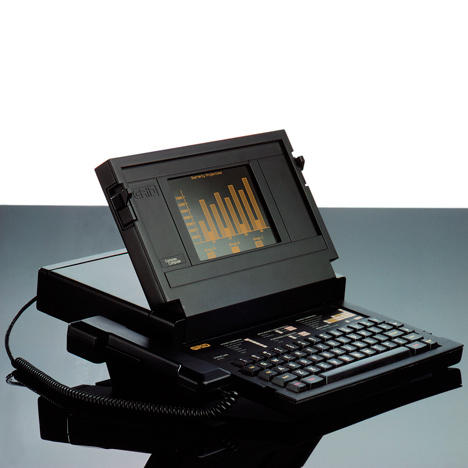Industrial designer Bill Moggridge, who designed the world's first laptop computer (above), has won the 2010 Prince Philip Designers Prize.
The annual prize, coordinated by the Design Council and announced last night, honours British designers who have most influenced and shaped daily lives. Top image: GRiD Compass computer, 1982. Above: next-generation GRiD Compass computer, 1984.
Moggridge, who co-founded design agency IDEO in the early 1990s, designed the GRiD Compass computer in 1982, for manufacturer GRiD Systems Corporation. Above: early prototype of the GRiD Compass computer, shown to potential investors. Below: Bill Moggridge.
Here's some info from the Design Council:
Creator of world’s first laptop computer wins royal Prize
The man who changed the way many of us live and work by designing the world’s first laptop computer -Bill Moggridge RDI - will be named the winner of the 2010 Prince Philip Designers Prize by HRH The Duke of Edinburgh at a ceremony at the Design Council in London this evening, Tuesday 9th November.
GRID Compass computer, 1982
Bill Moggridge was chosen to receive this year’s Prize from a stellar list of globally recognised nominees including avant-garde fashion designer Dame Vivienne Westwood, creator of the London 2012 Aquatics Centre Zaha Hadid and the creative powerhouse behind Burberry, Christopher Bailey. The Prize is awarded annually to recognise a lifetime contribution to design.
As one of the most pioneering designers of the 20th century, Bill Moggridge has been central to how design makes technology make sense to the people who use it. In the late 1980s, he was a leading force in creating the discipline of interaction design, which has set the terms for how human beings engage with computers. In the early 1990s he co-founded the design agency IDEO, which has arguably become the blueprint for the international, strategic creative agency. Today, he makes a forceful educational contribution as Director of the Smithsonian’s Cooper-Hewitt, National Design Museum.
With such an unprecedented line-up of nominees, the judges decided to also award three Special Commendations: to Dame Vivienne Westwood; to graphic designer Neville Brody; and furniture designer John Makepeace.
David Kester, Chief Executive of the Design Council, commented: “The Prince Philip Prize provides a timely reminder that we are a nation of innovative, sometimes maverick thinkers – that’s why the UK continues to be at the forefront of global design. Celebrating those talents is a vital part of inspiring our next generation of world-changing designers, innovators and creatives.”
This year’s nominees include pioneers and provocateurs covering a wide range of disciplines, from architecture to industrial, graphic and fashion design. Between them they provide a snapshot of the creative and commercial strengths of the UK design industry which can be seen on the Design Council’s website at www.designcouncil.org.uk/ppdp.
The Prince Philip Designers Prize, which last year celebrated its 50th anniversary, has been in existence since the early days of the Design Council. It was created by HRH as a response to post-war austerity, and aimed to stimulate and reward elegant solutions to design problems. In its half century, the prestigious award has rewarded the best in design from products and graphics to buildings and feats of engineering, and has put the spotlight on designers for influencing and shaping our daily lives.
Former winners of the Prize include Thomas Heatherwick (2006); the architect Lord Foster of Thamesbank (2004); Habitat founder Sir Terence Conran (2003); Pentagram founder Kenneth Grange (2001) and inventor Sir James Dyson (1997).

